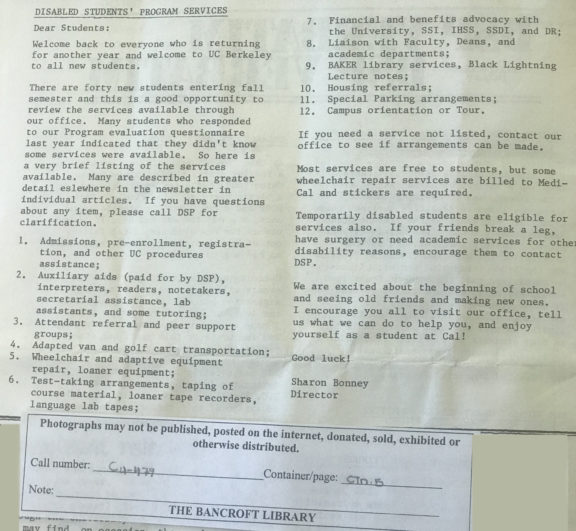In 1982 the PDSP dropped its ‘P’ and officially became the DSP. The DSP provided a variety of services to students with physical and non-orthopedic disabilities. Till the mid-1990s, the DSP provided students with a newsletter (as long as they filled out a subscription form.) this newsletter informed the students of services that are provided by the DSP, different campus organizations that may be of interest to them, or any change in policy or legislation that may affect the disabled students’ personally.
It is important to note here that in 1984 the number of students that were enrolled in the DSP was much less than it is today, therefore, the DSP had more resources to spend on each student, and it was able to provide students’ with a wider variety of services, with more personalized care. Due to various issues, including funding, the DSP of today is unable to meet the needs of all the students involved, in a timely manner.
The services provided by the DSP, in this newsletter include things such as pre-enrollment, auxiliary aids, attendant referral and peer support groups, adapted van and golf cart transportation, wheelchair repair, test-taking arrangements, Financial and benefits advocacy, DSP will be a liaison between the Dean, faculty, and academic departments, Library books will be brought to you, housing referrals, special parking arrangements, and campus tours.
Some of these services are either not provided anymore, or they are not commonly provided by the DSP at this time. an example of such a service is: The DSP will be a liaison between the Dean, Faculty, and academic departments. The DSP does send out ‘letters of accommodations to the faculty, on a student’s behalf. But it does not act as a centralized system which informs the UC Berkeley campus of the needs and accommodations required by the student. The student her/himself is the party responsible for doing this.
The article goes on to tell students that if they require a service that is not on the list, they should contact the DSP office where they may be able to provide it for them. The article notifies students that if they are temporarily disabled (for example, by a broken leg) they are eligible for DSP accommodations.
The article also states that “most services are free to students” except for some wheelchair repair services. This is different from some of the PDSP years where all of the services provided to the student were either provided by the Cal administration, the state, the Federal government, or a combination thereof.
